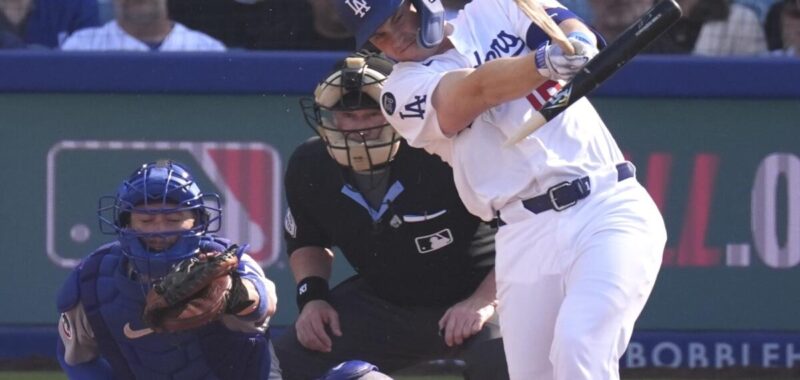It’s too early to sound any alarm bells. The lineup is too talented, they believe, for the narrative not to eventually turn.
But right now, the Dodgers’ biggest problem is not difficult to diagnose.
Their $400-million roster is not hitting, plain and simple.
And in a 4-2 defeat to the Chicago Cubs on Sunday, it cost them a third-straight series loss in the wake of their roaring 8-0 start to the season.
During that unbeaten barrage, when the Dodgers swept their opening series in Tokyo before winning all six games on their first homestand, the team’s star-studded lineup was performing as expected. Shohei Ohtani and Mookie Betts set the tone at the top. Teoscar Hernández, Tommy Edman and Will Smith cashed in with runners on base. And even though the bottom of the batting order was struggling, the Dodgers were still averaging more than 5 ½ runs per game, hardly seeming to notice Freddie Freeman’s early absence.
Over the last nine games, however, the offense has come to a screeching halt — serving as the biggest problem in their current 3-6 rut.
Ohtani and Betts have been solid, but far from superhuman. Everyone else is trudging along, if not toiling through a flat-out slump.
In manager Dave Roberts’ view, there has been a lack of quality “team at-bats,” with the manager bemoaning his team’s tendency to chase pitches out of the zone in key situations.
And even when the Dodgers have swung at the right pitches, they haven’t done much with them; a sobering reality that became all the more apparent in Sunday’s nationally televised rubber match loss.
With Chicago swingman Colin Rea serving as the Cubs’ opener, the Dodgers got plenty of good pitches to hit early in their Sunday Night Baseball showdown. Roughly a dozen times, Rea offered up mid-90s mph fastball near the heart of the plate.
But of the 16 heaters the Dodgers swung at against Rea, they whiffed six times, put only three in play and recorded just one hit — a Michael Conforto single in the second.
Conforto eventually came around to score that inning, after another single from Will Smith (a bloop hit on a first-pitch cutter) and a run-scoring knock from Kiké Hernández (his first non-home run of the season, after going deep for each of his first four hits).
From there, however, the Dodgers could mount little pressure. Rea pitched 3 ⅔ innings without allowing another run. And the Cubs bullpen was equally stout, permitting just one score the rest of the way.
On the mound, Tyler Glasnow bounced back from last week’s frustrating outing in Philadelphia, when he imploded during a third-inning rain shower for a disastrous five-run meltdown.
“He was frustrated at himself, rightfully so,” said Roberts, who sought out Glasnow this week to ensure he’d flushed any lingering disappointment. “He’s coming into today with a little bit of a chip on his shoulder.”
Over a strong six-inning start, Glasnow just did that, striking out seven batters, walking only one and surrendering just three hits.
The only problem: Two of those hits against Glasnow left the yard.
Pete Crow-Armstrong blasted a game-tying solo home run off the right-field foul pole in the third. Ex-Dodgers prospect Michael Busch ended a nine-pitch at-bat in the sixth with a solo shot to the Cubs bullpen, giving him six hits in his Chavez Ravine homecoming.
The Dodgers did get Glasnow off the hook for the loss in the sixth. Conforto singled again to lead off the inning. Smith doubled down the line to set up Max Muncy for a game-tying sacrifice fly.
But the Dodgers — as has so often been the case over the last couple of weeks — failed to tack on.
Then, the Cubs retook the lead with more long ball in the top of the seventh, with Crow-Armstrong launching on a hanging cutter from Blake Treinen to center for his second home run of the day.
The Dodgers gift-wrapped some insurance to the Cubs in the eighth, giving up another run after Conforto missed a fly ball near the left-field line for a leadoff double.
Given the way the Dodgers have swung the bats lately, however, Chicago didn’t need it. Over their final trips to the plate, the Dodgers’ only baserunner was via a stranded seventh-inning walk from Betts.
The Dodgers have now lost three consecutive series for the first time since last April, when they endured a similar early-season swoon. In that stretch, they have barely averaged three runs per game and are batting .218 as a team. And, half a month into the season, their struggles at the plate have given them their first big problem to address.

